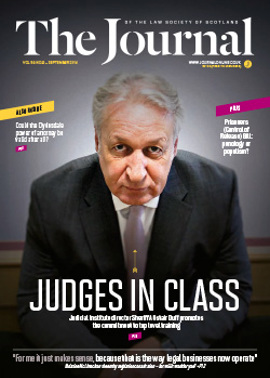Take the money?

Surprisingly enough, the issue of beneficiaries either being untraced or deliberately not cashing their legacy entitlement cheque is a relatively common one for Professional Practice. The team has therefore prepared these questions and answers for solicitors acting in executries:
What is the QLTR?
The Queen’s and Lord Treasurer’s Remembrancer (QLTR) is the Crown’s representative in Scotland who deals with bona vacantia (“BV”: ownerless property), ultimus haeres and treasure trove. The QLTR office (two solicitors and two administrative staff) is at Unit 5, 14 South St Andrew Street, Edinburgh EH2 2AZ (t: 0844 561 3899 or 0131 243 3210; e: COQLTR@copfs.gsi.gov.uk).
Under Scottish common law, ownerless goods fall to the Crown. The expression is applied by QLTR to the assets of dissolved companies, the assets of missing persons and lost or abandoned property. The concepts of ultimus haeres and treasure trove are not relevant to these questions, but are explained on the QLTR website: www.qltr.gov.uk
I have sent a cheque to a beneficiary for £50 but it has been returned “by the postal service”. What should I do?
You can discuss the position with the executors and take instructions from them, since they are your clients. However, in most cases they will be looking for guidance from you.
If the legacy is up to about £50, the executors may decide that it would not be economic to incur the costs of trying to trace the beneficiary. Although some tracing agencies offer a “no trace, no fee” service, and only charge about £60-£80 if successful, even such a charge could not be justified for a £50 legacy.
If it is clear that the balance represents Crown property, QLTR will accept it. For funds below £50, the QLTR will accept the letter to the beneficiary being returned marked “gone away” as sufficient evidence that the beneficiary cannot be traced. The guidance on rule B6.11 on the Society’s website explains how to send monies to QLTR. Any balance below £50 will not be returned by QLTR at a later date should the beneficiary subsequently come forward, as there is a £50 administration fee for returning a payment.
Where insufficient information is available to be sure that funds up to £50 represent Crown property, and as it is recognised that it is uneconomic to attempt further investigation, the executors would probably instruct that the funds be paid to them.
I have sent a cheque to a beneficiary for over £50, but it has been returned marked “gone away”. What should I do?
If the legacy is between about £50 and £100, payment can be made to QLTR after some consideration has been given to tracing the beneficiary. For a low amount, QLTR will require little effort to trace the beneficiary beyond, say, a letter to the beneficiary followed by a recorded delivery letter.
If the legacy is more than about £100, the executors may instruct you to try to trace the beneficiary on a “no trace, no fee” or other basis. The executors (or solicitor) should use reasonable endeavours to trace the beneficiary. It all depends whether the costs are justifiable in relation to the amount of the legacy. If the beneficiary cannot be traced, the payment can be made to QLTR. The reasonable costs of attempting to trace the beneficiary can be deducted from the amount paid.
For further information, the QLTR website states: “We expect the interested party to provide evidence of appropriate searches as to the person’s whereabouts (or their successors or representatives) or any explanation with supporting authority as to why the person (or their successors or representatives) could no longer make up title to or deal with the property, before considering whether to deal with the property as BV. The QLTR office would be happy to be approached to discuss what searches and investigations might be appropriate as circumstances arise.”
Details of efforts made to trace the beneficiary should be retained on the solicitor’s file to justify the making of payment to QLTR. When sending monies to QLTR, details should be given of not only the untraced beneficiary, but also the executors and the deceased to whom the executry relates.
If the beneficiary can be traced, are the costs of any enquiry agents or other tracing procedure outlays paid out of that beneficiary’s legacy or the whole executry estate?
It is the executors who administer the estate and, to some extent, they have a discretion. However, in the case of a specific legacy, it is likely to have been stated as being payable “free of interest, delivery expenses and government taxes” etc. The executors may then be vulnerable to complaint or claim by the beneficiary if the amount paid is reduced to take into account the tracing costs. Although it might appear unfair to the other beneficiaries, the situation in relation to a specific bequest would seem to be that it should be paid in full.
If the untraced beneficiary is a residuary beneficiary, the position is not so clear. The residual amount due is not clear at the outset and is only known once the assets and liabilities of the estate have been fully determined. Both the executors and the solicitor advising them will need to consider the possibility of a complaint or claim by the beneficiary who has had to be traced, compared with other beneficiaries who have been prejudiced by the tracing procedure. Ultimately, it will be the executors’ decision and will probably depend on the circumstances of the case.
What do I do where a beneficiary can be traced but refuses to cash his/her cheque?
This is a difficult situation to deal with. Such a beneficiary is not a “missing person”, and there may be no definitive proof that the property has been “abandoned”. However, QLTR would be prepared to look at the matter if there was evidence to confirm intention on the part of the beneficiary to abandon the legacy. Each case would be dealt with on its own circumstances.
It should be borne in mind that Accounts Rule B6.11 requires solicitors to deal with client balances held after the conclusion of a matter, and so this is a matter which will require to be resolved in order to ensure compliance with the Accounts Rules.
The executors are the clients and you can take instructions from them as to how to proceed. They would be entitled to instruct you to cancel the cheque and pay the money to the executors, since the executors will remain liable to the beneficiary. That would remove the funds from the client account. When following the executors’ instructions to send the legacy money to them, the executors should be advised that: (a) they hold it in trust for the beneficiary; (b) it should be held separately from their own funds; and (c) it should be held in an interest bearing account.
They should also be advised that if it subsequently becomes apparent that the beneficiary is effectively “abandoning” the legacy, they would have a duty under common law to pay the legacy to QLTR. Confirmation in writing of acceptance of the money on those terms should be obtained by the solicitor from the executors and recorded on the solicitor’s file.
In this issue
- Keep the job going?
- Asbestos and the state of knowledge
- Damned lies and bogus statistics
- Sorry seems to be the hardest word
- With a fair RWIND
- Planning land reform: the land of Scotland and the common good
- Reading for pleasure
- Opinion: Joanne Gosney
- Book reviews
- Profile
- President's column
- Roadshows roll out
- People on the move
- Outcomes, or own goals?
- Power and authority
- Licensed to reoffend?
- Raising the bar for the bench
- Title insurance – under the bonnet
- Working for Uncle Sam
- Family failings
- Shopping with protection
- Private sector progress at public sector expense?
- Rent review: the storm before the calm
- Doping: raising the stakes
- New financial services arm for ILG
- Under starter's orders
- Childcare: the benefits
- Law reform roundup
- Follow the leader
- Five years from when?
- Ask Ash
- Take the money?
- From the Brussels office
- Beware the bank calls
- Mentoring – why?






